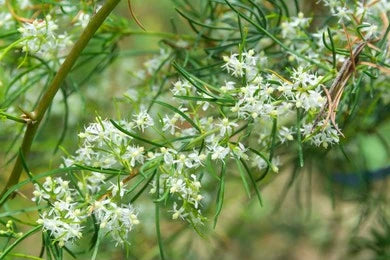The perennial climbing plant known as shatavari plant can grow up to two meters tall and has both straight and hooked spines. This herb has a bittersweet taste. Its juvenile stems are fragile and easily broken off. Fragrant Shatavari blooms with short spikes and a white tint. Shatavari roots are found in clusters and are white, tuberous, radish-shaped, and tapering at the end. The roots of older Shatavari plants are thicker and longer. Shatavari leaves resemble pine needles and are slender. Shatavari fruits are tiny berries that range in color from purple to black.
What is Shatavari?
"She who possesses 100 husbands" is how the name Shatavari is interpreted. It is a herb that has rejuvenating effects on the female reproductive organs and is beneficial not only for young women but also for middle-aged and older women, helping them to age gracefully and undergo menopause. Pitta Dosh is well balanced with Shatavari. In Ayurveda, Shatavari is called the "Queen of Herbs". It is the main herb that is advised for the health of women.
Being a naturally blessed herb, shatavari has several medical uses, including being an aphrodisiac, galactogogue, laxative, antispasmodic, antitumor, demulcent, adaptogenic, anti-microbial, anti-oxidant, and immunomodulator.
Chemical Constituents
- Root - Sitosterol, Asparagamine A, Sarsapogenin, two spirostanolic, two Furostanolic sponins
- Fruits - Diosenin, Asparamins A & B, B- sitosterol, Sarsasapogenin.
- Leaves - Flavonoids, Rutin.
Shatavari Classification
- Kingdom - Plantae
- Subkingdom - Tracheobionta
- Order - Asparagales
- Family - Asparagaceae
- Genus - Asparagus
- Species – Asparagus racemosus
Habitat
Forests that are tropical or subtropical are home to shatavari plants. Light, medium, and heavy soils are all suitable for this plant's growth. Asia (the Himalayas, Nepal, Pakistan, India, Sri Lanka, Australia, and Africa) is where it is most frequently found. Kerala, Tamil Nadu, Andhra Pradesh, Karnataka, Gujarat, Odisha, and West Bengal are the states in India where it is most prevalent. In its natural habitats, the plant faces extinction as a result of deforestation.
Shatavari Names
- Hindi Name - Shatavari
- English Name - Climbing Asparagus, Wild Asparagus, Buttermilk Root
- Kannada Name - Majjige Gadde
- Tamil Name - Sadavare
- Marathi, Gujarati Name - Satavari
- Konkani Name - Satavari
- Assamese Name - Satomul
- Bengali Name - Satmooli, Shatavar, Satamuli, Dogri: Sainsarbel.
- Gujarati Name - Shatavari
- Malayalam Name - Sathavari
- Manipuri Name - Nunggarei
- Oriya Name - Vari, Pali
- Punjabi Name - Chhotta Kelu
- Urdu Name - Satawar
- Arabic Name - Shakakul, Shaqaqul
- Chinese Name - Tian Men Dong
- Nepalese Name - Kurilo
Ayurvedic Properties
|
Particular |
Hindi / Sanskrit |
English |
|
Rasa (Taste) |
Madhura, Tikta |
Sweet, Bitter |
|
Guna (Physical Property) |
Guru, Snigdha |
Heavy, Oily |
|
Virya (Potency) |
Sheeta |
Cold |
|
Vipaka (Post-Digestive Taste) |
Madhura |
Sweet |
Effects on Dosha
It balances Pitta and Vata doshas.
|
Charak Samhita |
Sushruta Samhita |
Vagbhata |
|
|
|
Practical Uses
Nutritive, rejuvenating, aphrodisiac, laxative, galactogogue, antispasmodic, antacid, diuretic, antitumor, demulcent, anti-diarrheal, anti-depressant, anti-microbial, anti-oxidant, adaptogenic, and immunomodulator in nature are some of the medicinal properties of Asparagus racemosus.
- An extremely strong herb to keep the female reproductive system healthy.
- Shatavari promotes already regulated female hormones and eases discomfort and blood loss to treat PMS symptoms.
- In amenorrhea, dysmenorrhea, leucorrhea, and other pelvic inflammatory illnesses, it is a very helpful herb.
- Also supportive of the male reproductive system.
- Shatavari has the ability to raise white blood cell counts.
- It may activate macrophages, which aids in the fight against candida.
- This herb fortifies the body and helps to sustain a healthy level of energy.
- strong immune system booster.
- It is an excellent natural antioxidant that aids in the body's detoxification.
- Shatavari can adjust the vagina's pH level to a neutral state.
- It can nourish the body and remove dry membranes to achieve perfect fluid equilibrium.
- This herb can be taken by women who have had a hysterectomy and increases the amount of breast milk that moms produce.
- The fertility rate is significantly increased by shatavari, which nurtures the ovum.
- Males can even take the plant to treat their sexual issues.
- It has a cooling effect that can reduce inflammation, fever, and even stomach ulcers.
- Shatavari possesses antibacterial and antiviral characteristics that help fight off cholera, typhoid fever, diarrhea, and Staphylococcus aureus.
- By boosting the body's immune system, which can defend against harmful effects like stress, this plant helps reduce stress.
Part Used
- Roots
- Leaves
Dosage
- Shatavari Powder - 3-6 grams per day.
Caution
- Some persons may get skin or lung allergic responses after using Shatavari (Asparagus racemosus).
- When a person has edema from a renal disease or irregular heartbeat, they should not use it.

